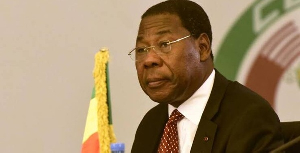General News of Tuesday, 2 July 2019
Source: www.ghanaweb.com
We’ll not ban plastics – Government
Minister of Environment, Science, Technology and Innovation has reiterated the stance of government on the issue of plastics, maintaining that government has no intention to outrightly ban the use of plastics in the country due to its wide usage and contribution to the economy.
According to Professor Kwabena Frimpong-Boateng, in spite of the plastic waste menace the country is battling with, banning its use would have regrettable implications on manufacturers who play pivotal roles in the economy.
“A year and a half ago, we were under pressure to ban plastics in Ghana because certain countries in Africa had banned plastics so we should do the same. We think that we should be very careful in the way we do that. Because if you ban something and you’re not able to monitor and police it, what do you do?” He questioned.
He said instead of banning plastics, government is relentlessly working on managing them, “…we think that the wholesale ban will not be in the interest of Ghana, because plastics are used everywhere. In the hospitals, in homes, in industries and agriculture and so on…The problem is that plastics are not bad but its management is problematic…”
It would be recalled that at a press meeting with the sanitation minister earlier this year, she revealed that Ghana produces about 300 tonnes of plastic waste but only 2 percent of that is recycled.
With this in mind, Prof. Kwabena has maintained that behavioural change, cross-sectorial engagement among others will help eradicate the plastic waste menace.
Despite several calls for the ban of plastics, the minister also noted that some plastic products with little or no importance to the economy would eventually be banned while those with significant usage in the economy will be managed.
He emphasized that managing plastics is a way of using it without compromising the health of users, jobs and the economic growth.
“We may start by banning things that we may not need, example, plastic bags, chewing gum, plastic cutlery, straw, and so on…we should learn how to manage plastics in its life cycle. When we do that it would be a very good thing. We would be able to create jobs, create employment and also clean our environment” the minister added.
Further on the issue of banning plastic materials, the minister noted that banning plastics may introduce the concept of smuggling it into the country. With Rwanda and Kenya as case study, he emphasized that, even though both countries have banned the use of plastics, they are still battling with the issue of smuggling and ban with exceptions.
No Plastic is completely biodegradable
Answering a question relating to the introduction of biodegradable materials in the manufacturing of plastics, the minister noted that no plastic is completely biodegradable.
There may be ways of introducing materials that can separate be seperated into smaller peices when exposed to environmental factors but are not completely degradable.
The minister added this option may come with its own consequences in the long and will not address the issues we are battling with.
“...There is no plastic that is entirely bio-degradable. What EPA did was to certify additives so you add to the plastics during the manufacturing process. This additive makes it oxo-biodegradable. That is, in the presence of light and so on it disintegrates into bits and pieces but it doesn’t disappear. You may not see it in the soil but it may enter into the sea...eventually accumulate and come back to us...” he explained.
Plastic waste levy
Professor Frimpong-Boateng also noted that, “...government has now set up the plastic levy. A bank account has been opened at the Bank of Ghana and the people who import plastics will have to pay some small levies which will be credited to this account and that money will be utilized in doing a lot of things that we want to do; plastic recycling and so on.”
The minister was speaking at the Meet the Press series held at the Information Ministry, Tuesday, July 2, 2019.












